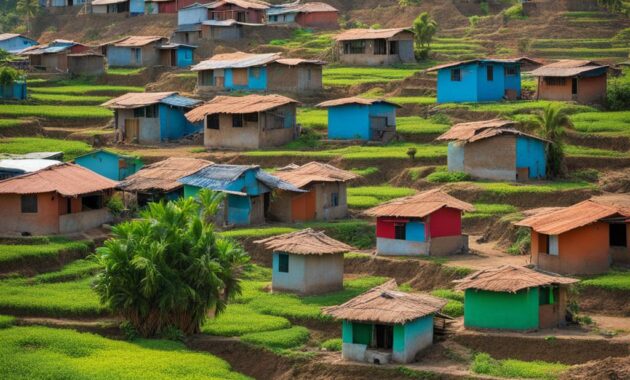Welcome to our latest article where we explore how the World Bank is driving global economic growth and reducing poverty. At the World Bank, we believe that every person should have the opportunity to live a life free from poverty, and we are committed to achieving this through our various initiatives and programs.
As a leading international financial institution, the World Bank plays a crucial role in supporting countries around the globe to achieve sustainable economic growth. Our focus is on empowering nations to build strong economies, improve infrastructure, and create jobs. We understand that economic growth is essential in reducing poverty and ensuring that every person has access to basic needs such as healthcare, education, and financial services.
Join us as we explore the impact of the World Bank on global economic growth and learn more about our commitment to reducing poverty through social welfare programs, education, healthcare, and much more. Together, we can make a difference.
The World Bank’s Impact on Global Economic Growth
When it comes to advancing economic development, the World Bank plays a significant role. Through its financial aid and expertise, the organization helps countries around the world to foster sustainable economic growth, create job opportunities and promote a better quality of life for their citizens.
One of the critical ways the World Bank drives economic development is by supporting infrastructure investment. According to a report released by the World Bank, investing in infrastructure can have a significant impact on economic growth, poverty reduction, and inequality reduction. Infrastructure investment can help improve access to essential services such as healthcare and education, increase productivity, and boost trade and commerce.
By providing financial aid and technical assistance, the World Bank can help countries achieve these goals. In some cases, they provide loans to help finance significant infrastructure projects, such as airports, energy grids, and highways. In other cases, they offer expertise and guidance to help governments design effective policies to foster sustainable economic growth.
Examples of World Bank-Funded Infrastructure Projects:
| Project | Location | Impact |
|---|---|---|
| Rural Development Project | Nepal | Improved agricultural productivity and access to markets. |
| Urban Transport Project | Bangladesh | Reduced traffic congestion, improved air quality, and increased economic activity. |
| Energy Sector Reform and Development | Jordan | Increased access to electricity, reduced energy costs, and improved reliability. |
It is important to note that the World Bank’s efforts to promote economic development are not limited to infrastructure investment. They also offer financial aid and expertise to help countries in a variety of sectors, including agriculture, health, and education. By empowering nations, the World Bank is making a significant impact on global economic growth.
Reducing Poverty: The World Bank’s Commitment
At the World Bank, we firmly believe that poverty should not be a barrier to progress and that every individual should have the opportunity to lead a fulfilling life. That is why we have made it our mission to reduce poverty through various initiatives and programs.
One of our primary strategies for poverty reduction is through social welfare programs. We recognize that poverty is not just about lack of money, but also encompasses lack of access to basic services and opportunities. To address this issue, we provide financial aid and expertise to governments for the development of social protection programs such as cash transfers, food subsidies, and pensions. These programs provide a safety net for vulnerable populations, helping to reduce poverty and inequality.
The Impact of Social Protection Programs
Social protection programs have proven to be effective in reducing poverty and promoting social inclusion. For example, in Mexico, our support for the social welfare program Oportunidades has lifted millions of people out of poverty. Similarly, in Ethiopia, our support for the Productive Safety Net Program has helped to reduce extreme poverty and improve food security for millions of people.
Another critical area of focus for us is education. We believe that education is a fundamental right and a key factor in reducing poverty. Through our funding and technical support, we help governments to improve access and quality of education for all, including girls and disadvantaged communities. By doing so, we aim to equip individuals with the skills and knowledge needed to break the cycle of poverty and improve their livelihoods.
Investing in Health and Financial Inclusion
Health is another crucial element in poverty reduction. We work with governments to strengthen healthcare systems and improve access to healthcare for all. Our focus is on maternal and child health, infectious disease control, and nutrition. By prioritizing these areas, we aim to reduce preventable deaths and improve the overall health and wellbeing of communities.
Finally, we also recognize the importance of financial inclusion in poverty reduction. Lack of access to financial services can create barriers to opportunities and perpetuate poverty. Through our support for financial inclusion initiatives, we aim to increase access to savings, credit, and insurance for the poor and underserved communities. This can help to create pathways out of poverty and towards economic empowerment.

“Our support for the social welfare program Oportunidades has lifted millions of people out of poverty.”
At the World Bank, we remain committed to our goal of reducing poverty and promoting shared prosperity. We recognize that there is still much work to be done, but we are optimistic about the progress we have made and the impact we can continue to have in empowering nations and improving lives. With continued support and collaboration, we believe that we can work towards a more equitable and prosperous world.”
Conclusion
Throughout this article, we have explored the significant impact of the World Bank in empowering nations and driving global progress. The World Bank’s commitment to promoting economic growth and reducing poverty has transformed the lives of millions of people worldwide.
The World Bank’s contribution to the global economy cannot be overstated. Its initiatives, such as infrastructure investment and financial aid, have helped numerous countries achieve sustainable economic development. By empowering nations through knowledge sharing and expertise, the World Bank has paved the way for a more prosperous and equitable world.
As we conclude, we must continue to acknowledge the essential role that the World Bank plays in creating a better future for us all. The World Bank’s global impact cannot be ignored, and we must continue to support its initiatives to drive progress around the world. By working together with the World Bank, we can make a significant difference in empowering nations and promoting global economic growth.




